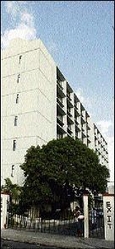IMF discussions far advanced
Published: Friday | July 10, 2009

A side view of the Ministry of Finance, in Kingston, home of the treasury. - File
A medium-term economic programme developed by Jamaica, has gone through several iterations that have been discussed in depth with International Monetary Fund (IMF) technocrats over the past three months, well placed sources have said, contradicting signals from government that IMF talks are still in their preliminary stages.
This financial programme indicates how Jamaica intends to manage and contain its fiscal deficit and balance of payments problem in the short-to-medium term and how it intends to turn around and reposition the economy for growth.
If the plan and its targets are endorsed by the IMF, this will allow Jamaica to access a standby borrowing arrangement with the Fund.
The IMF has indicated that it is prepared to lend Jamaica up to 300 per cent of its SDR quota, or US$1.2 billion, over the next three years.
Quite simply, in the development of an IMF programme the Jamaican authorities have to outline all the resources available in the economy and match this with all the private sector and public sector needs.
In other words, the IMF insists on looking not just at the books of the central Government, but at all the off-balance sheet transactions and debt build up in the public bodies, as well as the state of the productive sector and the demand for foreign exchange in the public and private sectors.
And in developing alternative scenarios, issues such as the pending changes in the PetroCaribe payment arrangements will be taken into consideration.
Jamaica will shortly be receiving a US$300 million increase in its SDR quota allocation from the IMF as part of the US$250 billion increase approved earlier this year by the Group of 20 countries.
The Bank of Jamaica will use these funds to boost the country's foreign exchange reserves, which will help to preserve stability in the foreign exchange market and providing confidence to importers that their demand for foreign exchange will be met.
The reserves held steady in June at US$1.6 billion.
No major stumbling blocks
At this time the IMF team and the BOJ officials are in basic agreement on the country's monetary policy framework, with no major stumbling blocks in terms of the proposals from the BOJ regarding overall monetary policy and the way forward.
However, on the fiscal side there is still work to be done.
In the short term, there are no easy fixes.
Since the beginning of the current financial year, the Ministry of Finance has been holding the reins tightly on government expenditure in all ministries and agencies, saving $3 billion in the first two months.
But more drastic cuts will have to be made in curbing government expenditure during the rest of the financial year, including the elimination of several public bodies and agencies, and a reduction in the overall public sector workforce.
The Financial Gleaner understands that the Jamaican team and the IMF are discussing the possibility of a wage and hiring freeze in the public sector, aside from the elimination of several agencies/bodies.
Were there to be an agreement, then severe adjustments will have to be made to the budget for programmes, as well as a re-examination of the debt restructuring option.
It is against this background that the current negotiations are being held with the IMF in Washington this week, with a further working visit by the IMF team to Jamaica scheduled for later this month.
If agreement can be reached on the parameters of the fiscal programme, then it is possible that an agreement could be put in place as early as next month.
Jamaica is way down the wicket in the development of a difficult structural adjustment programme with the IMF that will affect all sectors of the economy. The question is just how painful will it be.
renee.shirley@yahoo.com





















